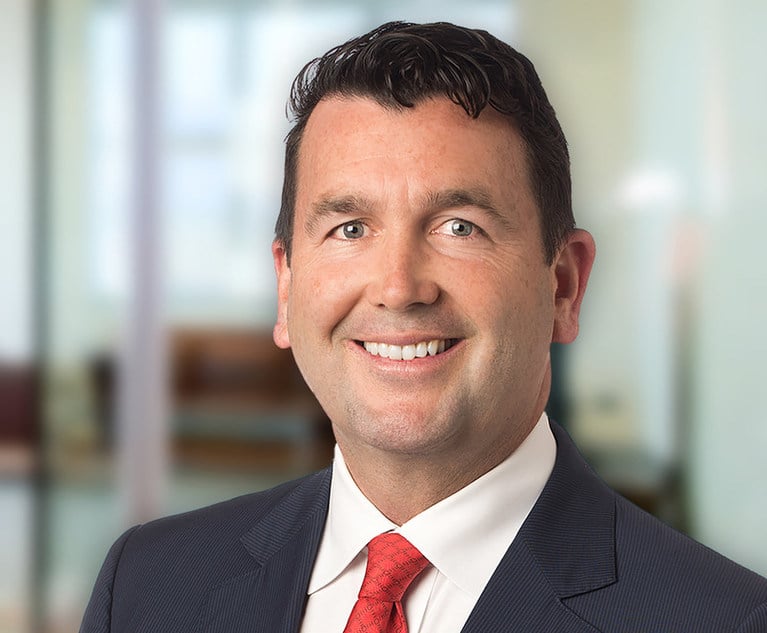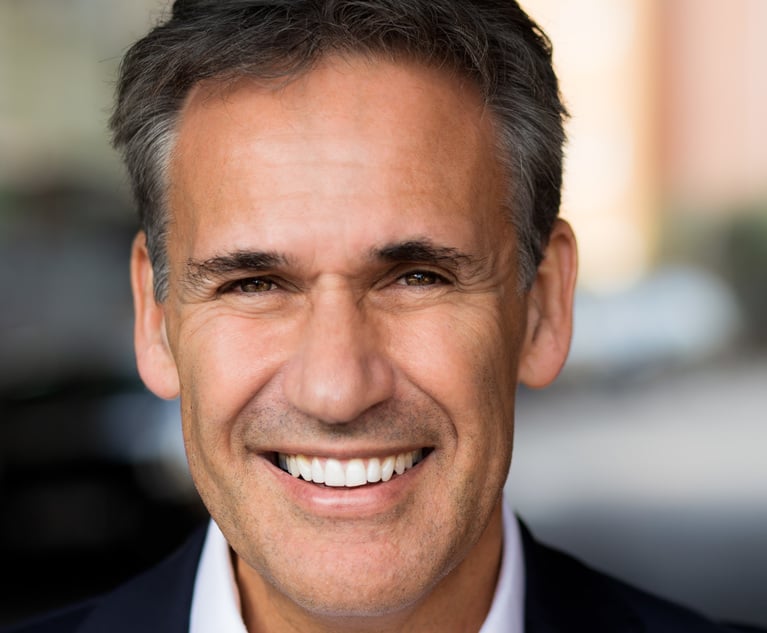ABA Summit Examines Why Seasoned Women Are Leaving the Law
At a national summit hosted by the American Bar Association at Harvard Law School this week, law firm leaders and general counsel are beginning the conversation as to why women are leaving the legal profession in the latter part of their careers.
November 08, 2017 at 04:22 PM
15 minute read
 ABA president Hilarie Bass. Photo by David Handschuh
ABA president Hilarie Bass. Photo by David Handschuh
The American Bar Association's Long-Term Careers for Women in Law initiative held its kickoff event at Harvard Law School on Wednesday where heads of law firms and legal departments attempted to disentangle the riddle as to why seasoned female lawyers are leaving the law.
“We've known for years that women were leaving the profession in high numbers,” said American Bar Association president Hilarie Bass, who helped develop the two-day national summit that included panel discussions with general counsel and law firm leaders, such as Buckley Sandler partner Christina Tchen, a former chief of staff to First Lady Michelle Obama, and Morgan, Lewis & Bockius chair Jami Wintz McKeon.
For nearly a quarter-century, women and men have been entering the legal field at the same rate; however, as the years go on, the number of women in the profession begins to dwindle. According to the ABA, women over 40 make up only 40 percent of lawyers at law firms, while women over 50 make up only 27 percent.
Law firms have always understood that there would be attrition around the childbearing years of a woman's career, but Bass said that recent studies show that women are actually leaving firms in their 40s and 50s.
“You've already had your children, you've come back from maternity leave, and at that point, you have all this experience and expertise, why would you leave then?” said Bass, who also serves as co-president of Greenberg Traurig from Miami.
Figuring out an answer to that question is the current focus of the ABA's Women in Law program. The initiative will conduct research throughout the year with the hope being that by the end of next summer, it will develop specific recommendations to combat the problem and present them to the ABA House of Delegates in August 2018.
“We're not suggesting everybody needs to work till 65 or 70 in law,” Bass quipped. “But if women are leaving because they're just tired of having fought for all these years and still not being treated how they perceive to be fairly and equally with men, that's a problem we need to address.”
Guy Halgren, another summit panelist who serves as chairman of the executive committee at Sheppard, Mullin, Richter & Hampton, said that it is critical to his firm's success to promote the long-term success of women.
“If we look at our most profitable, productive partners, they are in the age 50-to-65 range, and especially over the age of 60,” said Halgren, who was one of the few male faces in attendance at Harvard. “So if I'm going to keep those people—men and women—we need to make sure they feel engaged in a satisfying career and so I want to get ideas on how to do that better.”
 ABA president Hilarie Bass. Photo by David Handschuh
ABA president Hilarie Bass. Photo by David Handschuh
The American Bar Association's Long-Term Careers for Women in Law initiative held its kickoff event at
“We've known for years that women were leaving the profession in high numbers,” said American Bar Association president Hilarie Bass, who helped develop the two-day national summit that included panel discussions with general counsel and law firm leaders, such as
For nearly a quarter-century, women and men have been entering the legal field at the same rate; however, as the years go on, the number of women in the profession begins to dwindle. According to the ABA, women over 40 make up only 40 percent of lawyers at law firms, while women over 50 make up only 27 percent.
Law firms have always understood that there would be attrition around the childbearing years of a woman's career, but Bass said that recent studies show that women are actually leaving firms in their 40s and 50s.
“You've already had your children, you've come back from maternity leave, and at that point, you have all this experience and expertise, why would you leave then?” said Bass, who also serves as co-president of
Figuring out an answer to that question is the current focus of the ABA's Women in Law program. The initiative will conduct research throughout the year with the hope being that by the end of next summer, it will develop specific recommendations to combat the problem and present them to the ABA House of Delegates in August 2018.
“We're not suggesting everybody needs to work till 65 or 70 in law,” Bass quipped. “But if women are leaving because they're just tired of having fought for all these years and still not being treated how they perceive to be fairly and equally with men, that's a problem we need to address.”
Guy Halgren, another summit panelist who serves as chairman of the executive committee at
“If we look at our most profitable, productive partners, they are in the age 50-to-65 range, and especially over the age of 60,” said Halgren, who was one of the few male faces in attendance at Harvard. “So if I'm going to keep those people—men and women—we need to make sure they feel engaged in a satisfying career and so I want to get ideas on how to do that better.”
This content has been archived. It is available through our partners, LexisNexis® and Bloomberg Law.
To view this content, please continue to their sites.
Not a Lexis Subscriber?
Subscribe Now
Not a Bloomberg Law Subscriber?
Subscribe Now
NOT FOR REPRINT
© 2024 ALM Global, LLC, All Rights Reserved. Request academic re-use from www.copyright.com. All other uses, submit a request to [email protected]. For more information visit Asset & Logo Licensing.
You Might Like
View All
US Law Firm Leasing Up Nearly 30% Through Q3, With a Growing Number of Firms Staying in Place
3 minute read
Polsinelli's Revenue and Profits Surge Amid Partner De-Equitizations, Retirements
5 minute read
AI Expected to Transform Legal Field Even More as Technologies Evolve

Trending Stories
Who Got The Work
Michael G. Bongiorno, Andrew Scott Dulberg and Elizabeth E. Driscoll from Wilmer Cutler Pickering Hale and Dorr have stepped in to represent Symbotic Inc., an A.I.-enabled technology platform that focuses on increasing supply chain efficiency, and other defendants in a pending shareholder derivative lawsuit. The case, filed Oct. 2 in Massachusetts District Court by the Brown Law Firm on behalf of Stephen Austen, accuses certain officers and directors of misleading investors in regard to Symbotic's potential for margin growth by failing to disclose that the company was not equipped to timely deploy its systems or manage expenses through project delays. The case, assigned to U.S. District Judge Nathaniel M. Gorton, is 1:24-cv-12522, Austen v. Cohen et al.
Who Got The Work
Edmund Polubinski and Marie Killmond of Davis Polk & Wardwell have entered appearances for data platform software development company MongoDB and other defendants in a pending shareholder derivative lawsuit. The action, filed Oct. 7 in New York Southern District Court by the Brown Law Firm, accuses the company's directors and/or officers of falsely expressing confidence in the company’s restructuring of its sales incentive plan and downplaying the severity of decreases in its upfront commitments. The case is 1:24-cv-07594, Roy v. Ittycheria et al.
Who Got The Work
Amy O. Bruchs and Kurt F. Ellison of Michael Best & Friedrich have entered appearances for Epic Systems Corp. in a pending employment discrimination lawsuit. The suit was filed Sept. 7 in Wisconsin Western District Court by Levine Eisberner LLC and Siri & Glimstad on behalf of a project manager who claims that he was wrongfully terminated after applying for a religious exemption to the defendant's COVID-19 vaccine mandate. The case, assigned to U.S. Magistrate Judge Anita Marie Boor, is 3:24-cv-00630, Secker, Nathan v. Epic Systems Corporation.
Who Got The Work
David X. Sullivan, Thomas J. Finn and Gregory A. Hall from McCarter & English have entered appearances for Sunrun Installation Services in a pending civil rights lawsuit. The complaint was filed Sept. 4 in Connecticut District Court by attorney Robert M. Berke on behalf of former employee George Edward Steins, who was arrested and charged with employing an unregistered home improvement salesperson. The complaint alleges that had Sunrun informed the Connecticut Department of Consumer Protection that the plaintiff's employment had ended in 2017 and that he no longer held Sunrun's home improvement contractor license, he would not have been hit with charges, which were dismissed in May 2024. The case, assigned to U.S. District Judge Jeffrey A. Meyer, is 3:24-cv-01423, Steins v. Sunrun, Inc. et al.
Who Got The Work
Greenberg Traurig shareholder Joshua L. Raskin has entered an appearance for boohoo.com UK Ltd. in a pending patent infringement lawsuit. The suit, filed Sept. 3 in Texas Eastern District Court by Rozier Hardt McDonough on behalf of Alto Dynamics, asserts five patents related to an online shopping platform. The case, assigned to U.S. District Judge Rodney Gilstrap, is 2:24-cv-00719, Alto Dynamics, LLC v. boohoo.com UK Limited.
Featured Firms
Law Offices of Gary Martin Hays & Associates, P.C.
(470) 294-1674
Law Offices of Mark E. Salomone
(857) 444-6468
Smith & Hassler
(713) 739-1250










